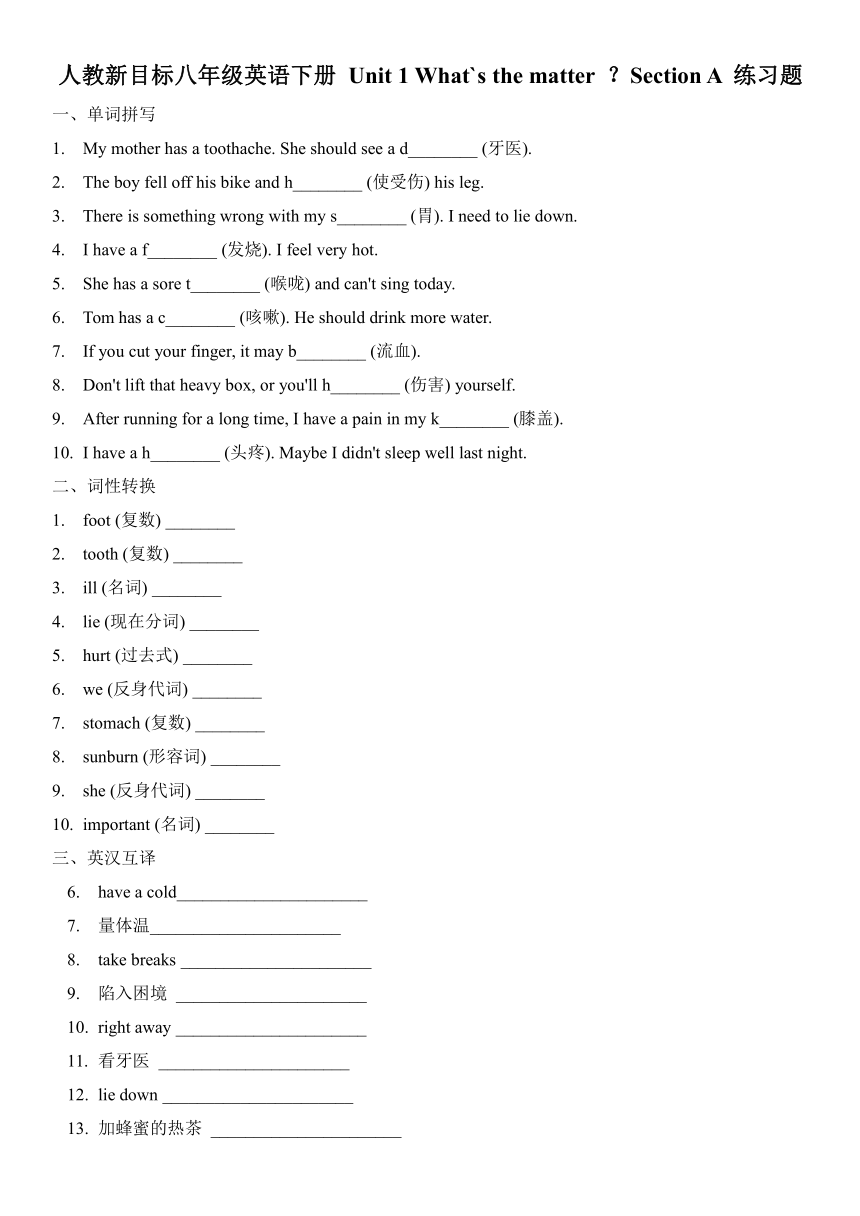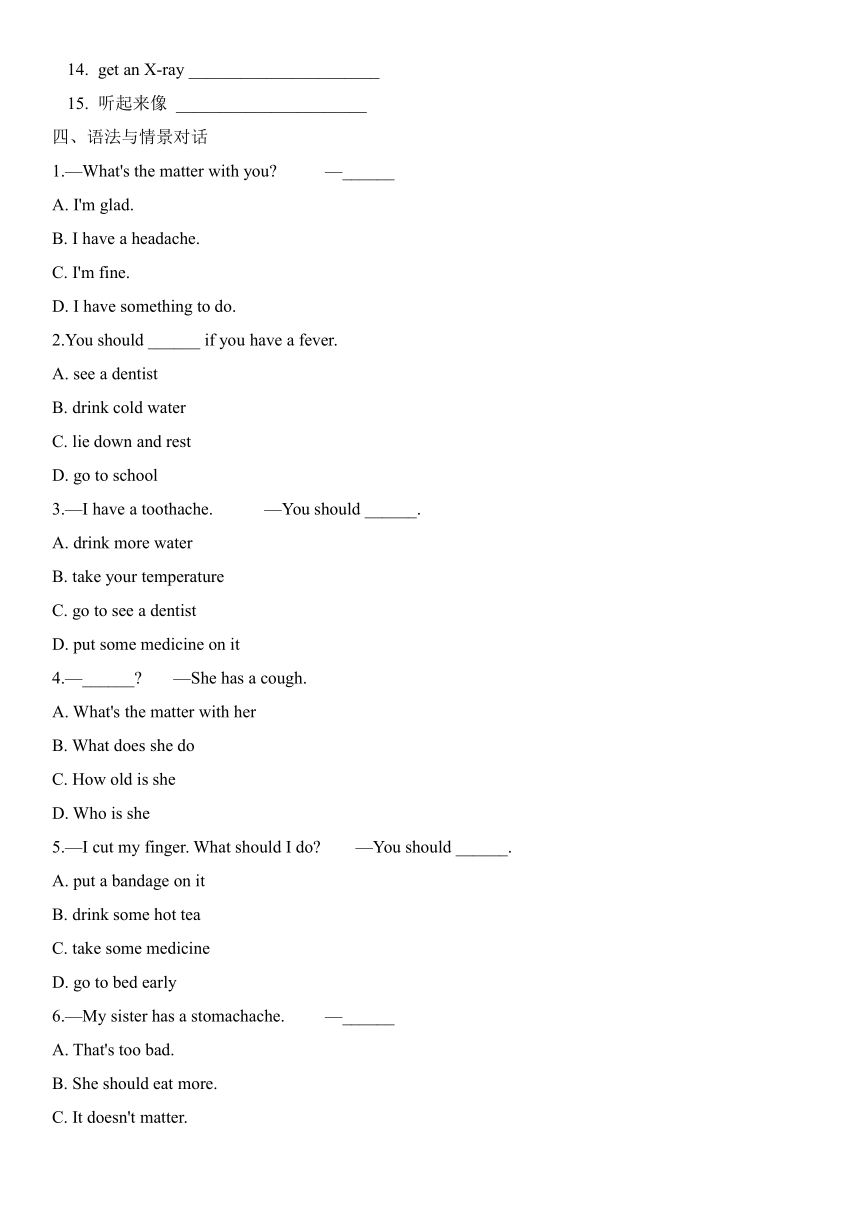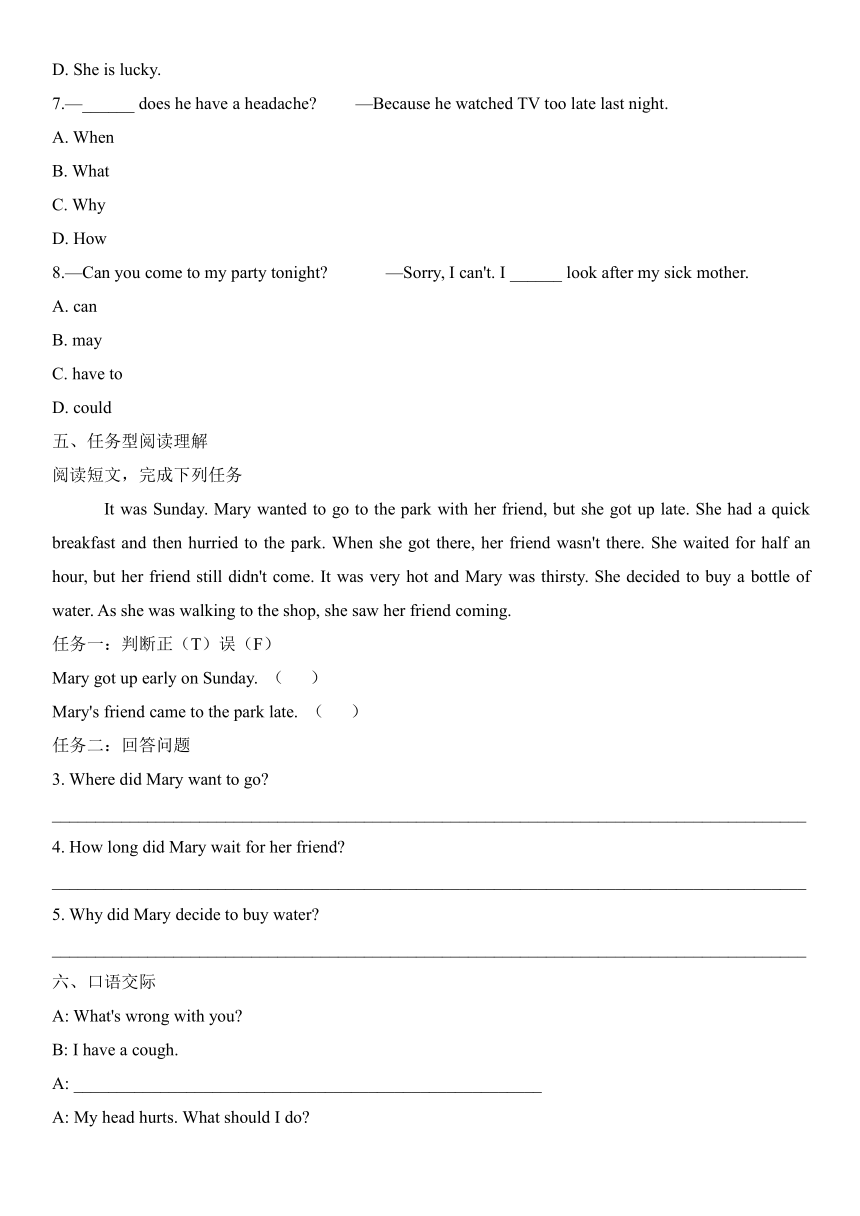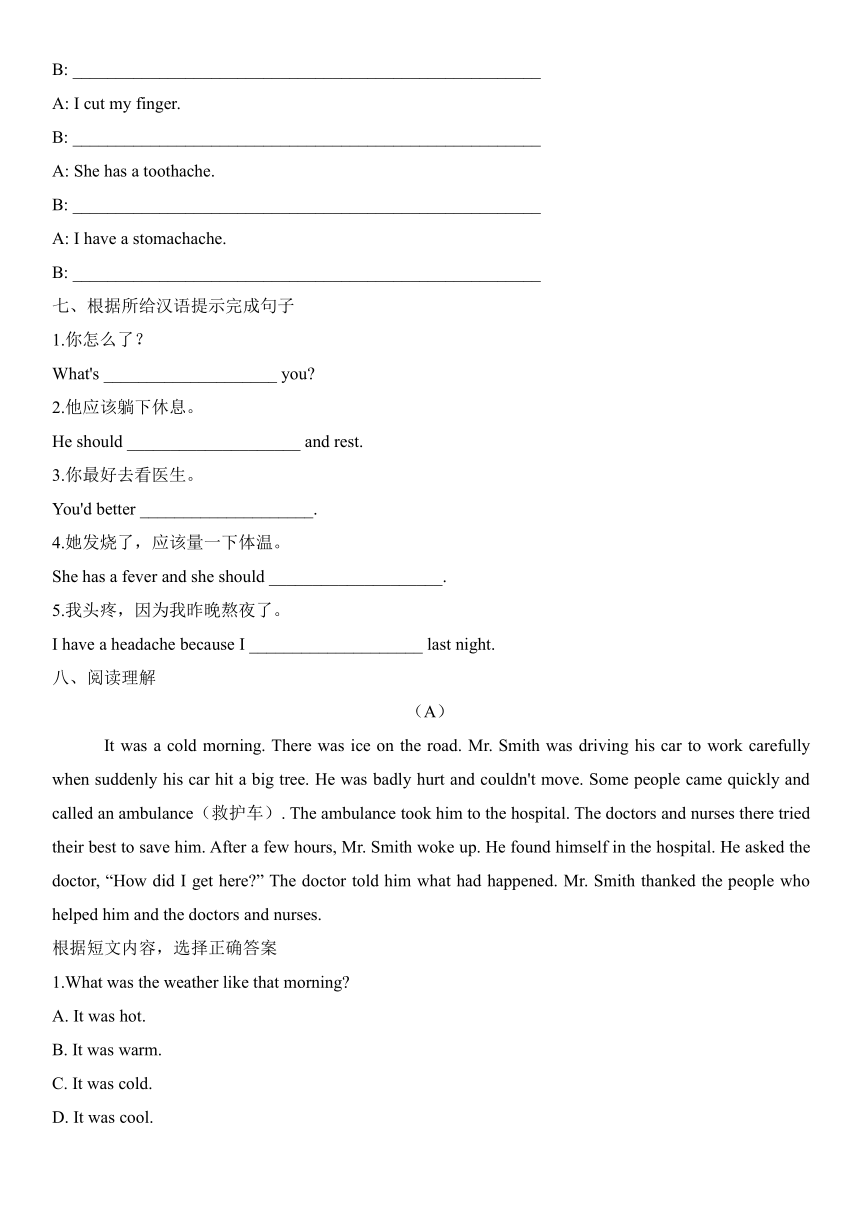Unit 1 What`s the matter ?Section A 练习题(含答案) 人教版八年级下册
文档属性
| 名称 | Unit 1 What`s the matter ?Section A 练习题(含答案) 人教版八年级下册 |

|
|
| 格式 | docx | ||
| 文件大小 | 28.4KB | ||
| 资源类型 | 教案 | ||
| 版本资源 | 人教新目标(Go for it)版 | ||
| 科目 | 英语 | ||
| 更新时间 | 2025-03-01 00:00:00 | ||
图片预览




文档简介
人教新目标八年级英语下册 Unit 1 What`s the matter ?Section A 练习题
一、单词拼写
My mother has a toothache. She should see a d________ (牙医).
The boy fell off his bike and h________ (使受伤) his leg.
There is something wrong with my s________ (胃). I need to lie down.
I have a f________ (发烧). I feel very hot.
She has a sore t________ (喉咙) and can't sing today.
Tom has a c________ (咳嗽). He should drink more water.
If you cut your finger, it may b________ (流血).
Don't lift that heavy box, or you'll h________ (伤害) yourself.
After running for a long time, I have a pain in my k________ (膝盖).
I have a h________ (头疼). Maybe I didn't sleep well last night.
二、词性转换
foot (复数) ________
tooth (复数) ________
ill (名词) ________
lie (现在分词) ________
hurt (过去式) ________
we (反身代词) ________
stomach (复数) ________
sunburn (形容词) ________
she (反身代词) ________
important (名词) ________
三、英汉互译
have a cold______________________
量体温______________________
take breaks ______________________
陷入困境 ______________________
right away ______________________
看牙医 ______________________
lie down ______________________
加蜂蜜的热茶 ______________________
get an X-ray ______________________
听起来像 ______________________
四、语法与情景对话
1.—What's the matter with you —______
A. I'm glad.
B. I have a headache.
C. I'm fine.
D. I have something to do.
2.You should ______ if you have a fever.
A. see a dentist
B. drink cold water
C. lie down and rest
D. go to school
3.—I have a toothache. —You should ______.
A. drink more water
B. take your temperature
C. go to see a dentist
D. put some medicine on it
4.—______ —She has a cough.
A. What's the matter with her
B. What does she do
C. How old is she
D. Who is she
5.—I cut my finger. What should I do —You should ______.
A. put a bandage on it
B. drink some hot tea
C. take some medicine
D. go to bed early
6.—My sister has a stomachache. —______
A. That's too bad.
B. She should eat more.
C. It doesn't matter.
D. She is lucky.
7.—______ does he have a headache —Because he watched TV too late last night.
A. When
B. What
C. Why
D. How
8.—Can you come to my party tonight —Sorry, I can't. I ______ look after my sick mother.
A. can
B. may
C. have to
D. could
五、任务型阅读理解
阅读短文,完成下列任务
It was Sunday. Mary wanted to go to the park with her friend, but she got up late. She had a quick breakfast and then hurried to the park. When she got there, her friend wasn't there. She waited for half an hour, but her friend still didn't come. It was very hot and Mary was thirsty. She decided to buy a bottle of water. As she was walking to the shop, she saw her friend coming.
任务一:判断正(T)误(F)
Mary got up early on Sunday. ( )
Mary's friend came to the park late. ( )
任务二:回答问题
3. Where did Mary want to go
_______________________________________________________________________________________
4. How long did Mary wait for her friend
_______________________________________________________________________________________
5. Why did Mary decide to buy water
_______________________________________________________________________________________
六、口语交际
A: What's wrong with you
B: I have a cough.
A: ______________________________________________________
A: My head hurts. What should I do
B: ______________________________________________________
A: I cut my finger.
B: ______________________________________________________
A: She has a toothache.
B: ______________________________________________________
A: I have a stomachache.
B: ______________________________________________________
七、根据所给汉语提示完成句子
1.你怎么了?
What's ____________________ you
2.他应该躺下休息。
He should ____________________ and rest.
3.你最好去看医生。
You'd better ____________________.
4.她发烧了,应该量一下体温。
She has a fever and she should ____________________.
5.我头疼,因为我昨晚熬夜了。
I have a headache because I ____________________ last night.
八、阅读理解
(A)
It was a cold morning. There was ice on the road. Mr. Smith was driving his car to work carefully when suddenly his car hit a big tree. He was badly hurt and couldn't move. Some people came quickly and called an ambulance(救护车). The ambulance took him to the hospital. The doctors and nurses there tried their best to save him. After a few hours, Mr. Smith woke up. He found himself in the hospital. He asked the doctor, “How did I get here ” The doctor told him what had happened. Mr. Smith thanked the people who helped him and the doctors and nurses.
根据短文内容,选择正确答案
1.What was the weather like that morning
A. It was hot.
B. It was warm.
C. It was cold.
D. It was cool.
2.What happened to Mr. Smith
A. His car hit a big tree.
B. He had a heart attack.
C. He was robbed.
D. He fell down.
3.Who called the ambulance
A. Mr. Smith himself.
B. Some people passing by.
C. The police.
D. The doctors.
4.Where did Mr. Smith wake up
A. At home.
B. In the car.
C. On the road.
D. In the hospital.
5.What did Mr. Smith do after waking up
A. He left the hospital.
B. He thanked the people who helped him.
C. He called his family.
D. He went to work.
(B)
One day, a little boy came into a shop. He had five dollars and he wanted to buy some apples. “Give me apples for five dollars, please,” he said to the shopkeeper. When the shopkeeper gave him the apples, the boy counted them and felt very surprised. “You gave me too many apples,” he said. “I only have five dollars.” “Don't worry, kid,” said the shopkeeper. “The more apples you take, the better it is for me.” But the boy didn't take all the apples. He only took the number of apples he could pay for. Then he left the shop.
根据短文内容,判断正(T)误(F)
The boy had ten dollars. ( )
The boy wanted to buy some apples. ( )
The shopkeeper gave the boy too few apples. ( )
The boy took all the apples. ( )
The boy was honest. ( )
答案解析
一、单词拼写
“看牙医”,“牙医” 的英文是 dentist,是一个名词,在句中作宾语,see a dentist 是固定搭配,表示去看牙医。
“使受伤”,hurt 在这里作谓语动词,根据前文 fell 可知句子时态是一般过去时,hurt 的过去式还是 hurt。
“胃”,stomach,是名词,在句中作宾语,have something wrong with + 身体部位,表示某个身体部位不舒服。
“发烧”,fever,固定搭配 have a fever,在句中作宾语。
“喉咙”,throat,sore throat 是 “喉咙痛” 的常用表达,在句中作宾语。
“咳嗽”,cough,have a cough 表示咳嗽,在句中作宾语。
“流血”,bleed,情态动词 may 后接动词原形,所以填 bleed,在句中作谓语。
“伤害”,hurt,will 后接动词原形,hurt oneself 表示伤到自己,在句中作谓语。
“膝盖”,knee,in my knee 表示在我的膝盖处,作介词宾语。
“头疼”,headache,have a headache 是固定短语,在句中作宾语。
二、词性转换
foot 的复数形式是 feet,属于不规则变化,需特殊记忆。
tooth 的复数形式是 teeth,同样是不规则变化。
ill 的名词形式是 illness,在词尾加 -ness,把形容词变为名词,表示 “疾病”。
lie 作 “躺;平躺” 讲时,现在分词是 lying,要把 ie 变为 y 再加 -ing。
hurt 的过去式是 hurt,它的原形、过去式和过去分词形式相同。
we 的反身代词是 ourselves,是 “我们自己” 的意思,在句中作宾语或同位语,起强调作用。
stomach 的复数形式是 stomachs,直接加 -s 即可,虽然以 ch 结尾,但这里 ch 发音是 /k/,不是 /t /,所以遵循一般加 -s 的规则。
sunburn 的形容词形式是 sunburned 或 sunburnt,两种形式都可以,表示 “晒伤的”,用于修饰名词。
she 的反身代词是 herself,意为 “她自己”,用法同其他反身代词。
important 的名词形式是 importance,把 -t 变为 -ce,是 “重要性” 的意思,在句中作主语、宾语等。
三、英汉互译
have a cold:这是一个固定短语,cold 在这里作名词,意为 “感冒”,have a + 疾病名称,表示患有某种疾病,所以是 “感冒”。
量体温:take one's temperature,take 在这里是 “测量” 的意思,one's 根据主语的人称和数进行变化,如 my、your 等,temperature 是 “体温”。
take breaks:break 作名词有 “休息” 的意思,take breaks 或 take a break 都表示 “休息”,这里用复数形式强调多次休息。
陷入困境:get into trouble,get into 是 “陷入;进入” 的意思,trouble 是 “麻烦;困境”,是固定短语搭配。
right away:right 在这里起强调作用,有 “立刻;马上” 的意思,away 也有 “离开;远去” 的含义,合起来表示 “立即;马上”,在句中作状语,修饰动词。
看牙医:see a dentist,see 有 “看(医生、电影等)” 的意思,dentist 是 “牙医”,是日常表达看病的固定搭配。
lie down:lie 是 “躺” 的意思,down 是副词 “向下”,lie down 就是 “躺下”,在句中作谓语,通常用于描述身体状态,让人躺下休息等场景。
加蜂蜜的热茶:hot tea with honey,hot tea 是 “热茶”,with 表示 “带有;具有”,honey 是 “蜂蜜”,用来修饰 tea,说明茶的特征。
get an X-ray:get 在这里有 “进行;接受” 的意思,X-ray 是 “X 光”,get an X-ray 就是 “拍 X 光片”,在医疗场景中常用。
听起来像:sound like,sound 是系动词,意为 “听起来”,like 是介词 “像”,后面接名词或名词短语,用来描述某种声音给人的感觉像什么。
四、语法与情景对话
问句是问 “你怎么了?”,A 选项 “我很高兴”,C 选项 “我很好”,D 选项 “我有事情要做” 都不符合语境,B 选项 “我头疼” 回答了身体不舒服的情况,所以选 B。
“发烧” 应该 “躺下休息”,A 选项 “看牙医” 是牙齿有问题时做的,B 选项 “喝冷水” 不利于发烧恢复,D 选项 “去上学” 身体不适不应该去上学,C 选项符合常理,所以选 C。
“牙疼” 应该 “去看牙医”,A 选项 “多喝水” 对牙疼缓解作用不大,B 选项 “量体温” 不是针对牙疼的直接措施,D 选项 “在上面敷药” 一般不是牙疼的常规处理,C 选项正确,所以选 C。
根据答语 “她咳嗽” 可知问句是问 “她怎么了?”,A 选项符合,B 选项 “她是做什么的” 问职业,C 选项 “她多大了” 问年龄,D 选项 “她是谁” 问身份,所以选 A。
“割破手指” 应该 “包扎”,A 选项 put a bandage on it 是正确的处理方式,B 选项 “喝些热茶” 不解决手指受伤问题,C 选项 “吃些药” 通常不是手指割破的首要处理,D 选项 “早点睡觉” 也与伤口处理无关,所以选 A。
“我妹妹胃疼”,A 选项 “那太糟糕了” 表达同情,符合语境,B 选项 “她应该多吃” 胃疼时不适合多吃,C 选项 “没关系” 对别人身体不适这样说不合适,D 选项 “她很幸运” 与胃疼事实相悖,所以选 A。
根据答语 “因为他昨晚看电视太晚” 可知问句问原因,用 Why,A 选项 When 问时间,B 选项 What 问事物,D 选项 How 问方式,所以选 C。
问句 “你今晚能来我的派对吗?”,答语 “对不起,我不能”,后面解释原因 “我不得不照顾我生病的妈妈”,have to 有 “不得不” 的意思,强调客观需要,A 选项 can 表示 “能够”,B 选项 may 表示 “也许;可以”,D 选项 could 是 can 的过去式,表委婉或过去的能力,都不符合语境,所以选 C。
五、任务型阅读理解
任务一:
原文提到 “but she got up late”,说明她起床晚,不是早,所以是 F。
文中说 “She waited for half an hour, but her friend still didn't come. As she was walking to the shop, she saw her friend coming.” 可知朋友来晚了,所以是 T。
任务二:
3. 文中明确提到 “Mary wanted to go to the park with her friend”,所以答案是 She wanted to go to the park.
4. 根据 “She waited for half an hour” 可知等了半小时,答案是 For half an hour.
5. 原文提到 “It was very hot and Mary was thirsty. She decided to buy a bottle of water.”,所以是因为天热且她口渴,答案是 Because it was very hot and she was thirsty.
六、口语交际
已知对方咳嗽,应该建议多喝水、好好休息,所以可以说 You should drink more water and have a good rest.
对方头疼,建议躺下休息,还可以加上吃点药,如 You should lie down and have a rest. Maybe you can take some medicine.
对方割破手指,要给出包扎手指的建议,即 You should put a bandage on it.
她牙疼,就应该去看牙医,回答 She should go to see a dentist.
对方胃疼,建议先躺下,短时间内不要吃太多,说 You should lie down and not eat too much for a while.
七、根据所给汉语提示完成句子
What's the matter with sb. 是询问某人怎么了的固定句型,所以填 the matter with。
“躺下” 是 lie down,should 是情态动词,后接动词原形,所以填 lie down。
“看医生” 是 go to see a doctor,had better 后接动词原形,所以填 go to see a doctor。
“量体温” 是 take one's temperature,这里主语是 she,所以填 take her temperature。
“熬夜” 是 stay up late,根据 last night 可知句子是一般过去时,stay 的过去式是 stayed,所以填 stayed up late。
八、阅读理解
文章开头提到 “It was a cold morning.”,所以选 C。
文中说 “Mr. Smith was driving his car to work carefully when suddenly his car hit a big tree.”,可知他开车撞到树了,选 A。
原文 “Some people came quickly and called an ambulance.” 说明是路过的一些人叫的救护车,选 B。
根据 “After a few hours, Mr. Smith woke up. He found himself in the hospital.” 可知他在医院醒来,选 D。
文中提到 “Mr. Smith thanked the people who helped him and the doctors and nurses.”,所以选 B。
原文 “He had five dollars”,不是十美元,所以是 F。
文中 “He had five dollars and he wanted to buy some apples.” 表明他想买苹果,所以是 T。
男孩说 “You gave me too many apples”,不是太少,所以是 F。
文中 “But the boy didn't take all the apples.” 说明他没拿所有苹果,所以是 F。
男孩只拿了他付得起钱的苹果,没有多拿,说明他很诚实,所以是 T。
一、单词拼写
My mother has a toothache. She should see a d________ (牙医).
The boy fell off his bike and h________ (使受伤) his leg.
There is something wrong with my s________ (胃). I need to lie down.
I have a f________ (发烧). I feel very hot.
She has a sore t________ (喉咙) and can't sing today.
Tom has a c________ (咳嗽). He should drink more water.
If you cut your finger, it may b________ (流血).
Don't lift that heavy box, or you'll h________ (伤害) yourself.
After running for a long time, I have a pain in my k________ (膝盖).
I have a h________ (头疼). Maybe I didn't sleep well last night.
二、词性转换
foot (复数) ________
tooth (复数) ________
ill (名词) ________
lie (现在分词) ________
hurt (过去式) ________
we (反身代词) ________
stomach (复数) ________
sunburn (形容词) ________
she (反身代词) ________
important (名词) ________
三、英汉互译
have a cold______________________
量体温______________________
take breaks ______________________
陷入困境 ______________________
right away ______________________
看牙医 ______________________
lie down ______________________
加蜂蜜的热茶 ______________________
get an X-ray ______________________
听起来像 ______________________
四、语法与情景对话
1.—What's the matter with you —______
A. I'm glad.
B. I have a headache.
C. I'm fine.
D. I have something to do.
2.You should ______ if you have a fever.
A. see a dentist
B. drink cold water
C. lie down and rest
D. go to school
3.—I have a toothache. —You should ______.
A. drink more water
B. take your temperature
C. go to see a dentist
D. put some medicine on it
4.—______ —She has a cough.
A. What's the matter with her
B. What does she do
C. How old is she
D. Who is she
5.—I cut my finger. What should I do —You should ______.
A. put a bandage on it
B. drink some hot tea
C. take some medicine
D. go to bed early
6.—My sister has a stomachache. —______
A. That's too bad.
B. She should eat more.
C. It doesn't matter.
D. She is lucky.
7.—______ does he have a headache —Because he watched TV too late last night.
A. When
B. What
C. Why
D. How
8.—Can you come to my party tonight —Sorry, I can't. I ______ look after my sick mother.
A. can
B. may
C. have to
D. could
五、任务型阅读理解
阅读短文,完成下列任务
It was Sunday. Mary wanted to go to the park with her friend, but she got up late. She had a quick breakfast and then hurried to the park. When she got there, her friend wasn't there. She waited for half an hour, but her friend still didn't come. It was very hot and Mary was thirsty. She decided to buy a bottle of water. As she was walking to the shop, she saw her friend coming.
任务一:判断正(T)误(F)
Mary got up early on Sunday. ( )
Mary's friend came to the park late. ( )
任务二:回答问题
3. Where did Mary want to go
_______________________________________________________________________________________
4. How long did Mary wait for her friend
_______________________________________________________________________________________
5. Why did Mary decide to buy water
_______________________________________________________________________________________
六、口语交际
A: What's wrong with you
B: I have a cough.
A: ______________________________________________________
A: My head hurts. What should I do
B: ______________________________________________________
A: I cut my finger.
B: ______________________________________________________
A: She has a toothache.
B: ______________________________________________________
A: I have a stomachache.
B: ______________________________________________________
七、根据所给汉语提示完成句子
1.你怎么了?
What's ____________________ you
2.他应该躺下休息。
He should ____________________ and rest.
3.你最好去看医生。
You'd better ____________________.
4.她发烧了,应该量一下体温。
She has a fever and she should ____________________.
5.我头疼,因为我昨晚熬夜了。
I have a headache because I ____________________ last night.
八、阅读理解
(A)
It was a cold morning. There was ice on the road. Mr. Smith was driving his car to work carefully when suddenly his car hit a big tree. He was badly hurt and couldn't move. Some people came quickly and called an ambulance(救护车). The ambulance took him to the hospital. The doctors and nurses there tried their best to save him. After a few hours, Mr. Smith woke up. He found himself in the hospital. He asked the doctor, “How did I get here ” The doctor told him what had happened. Mr. Smith thanked the people who helped him and the doctors and nurses.
根据短文内容,选择正确答案
1.What was the weather like that morning
A. It was hot.
B. It was warm.
C. It was cold.
D. It was cool.
2.What happened to Mr. Smith
A. His car hit a big tree.
B. He had a heart attack.
C. He was robbed.
D. He fell down.
3.Who called the ambulance
A. Mr. Smith himself.
B. Some people passing by.
C. The police.
D. The doctors.
4.Where did Mr. Smith wake up
A. At home.
B. In the car.
C. On the road.
D. In the hospital.
5.What did Mr. Smith do after waking up
A. He left the hospital.
B. He thanked the people who helped him.
C. He called his family.
D. He went to work.
(B)
One day, a little boy came into a shop. He had five dollars and he wanted to buy some apples. “Give me apples for five dollars, please,” he said to the shopkeeper. When the shopkeeper gave him the apples, the boy counted them and felt very surprised. “You gave me too many apples,” he said. “I only have five dollars.” “Don't worry, kid,” said the shopkeeper. “The more apples you take, the better it is for me.” But the boy didn't take all the apples. He only took the number of apples he could pay for. Then he left the shop.
根据短文内容,判断正(T)误(F)
The boy had ten dollars. ( )
The boy wanted to buy some apples. ( )
The shopkeeper gave the boy too few apples. ( )
The boy took all the apples. ( )
The boy was honest. ( )
答案解析
一、单词拼写
“看牙医”,“牙医” 的英文是 dentist,是一个名词,在句中作宾语,see a dentist 是固定搭配,表示去看牙医。
“使受伤”,hurt 在这里作谓语动词,根据前文 fell 可知句子时态是一般过去时,hurt 的过去式还是 hurt。
“胃”,stomach,是名词,在句中作宾语,have something wrong with + 身体部位,表示某个身体部位不舒服。
“发烧”,fever,固定搭配 have a fever,在句中作宾语。
“喉咙”,throat,sore throat 是 “喉咙痛” 的常用表达,在句中作宾语。
“咳嗽”,cough,have a cough 表示咳嗽,在句中作宾语。
“流血”,bleed,情态动词 may 后接动词原形,所以填 bleed,在句中作谓语。
“伤害”,hurt,will 后接动词原形,hurt oneself 表示伤到自己,在句中作谓语。
“膝盖”,knee,in my knee 表示在我的膝盖处,作介词宾语。
“头疼”,headache,have a headache 是固定短语,在句中作宾语。
二、词性转换
foot 的复数形式是 feet,属于不规则变化,需特殊记忆。
tooth 的复数形式是 teeth,同样是不规则变化。
ill 的名词形式是 illness,在词尾加 -ness,把形容词变为名词,表示 “疾病”。
lie 作 “躺;平躺” 讲时,现在分词是 lying,要把 ie 变为 y 再加 -ing。
hurt 的过去式是 hurt,它的原形、过去式和过去分词形式相同。
we 的反身代词是 ourselves,是 “我们自己” 的意思,在句中作宾语或同位语,起强调作用。
stomach 的复数形式是 stomachs,直接加 -s 即可,虽然以 ch 结尾,但这里 ch 发音是 /k/,不是 /t /,所以遵循一般加 -s 的规则。
sunburn 的形容词形式是 sunburned 或 sunburnt,两种形式都可以,表示 “晒伤的”,用于修饰名词。
she 的反身代词是 herself,意为 “她自己”,用法同其他反身代词。
important 的名词形式是 importance,把 -t 变为 -ce,是 “重要性” 的意思,在句中作主语、宾语等。
三、英汉互译
have a cold:这是一个固定短语,cold 在这里作名词,意为 “感冒”,have a + 疾病名称,表示患有某种疾病,所以是 “感冒”。
量体温:take one's temperature,take 在这里是 “测量” 的意思,one's 根据主语的人称和数进行变化,如 my、your 等,temperature 是 “体温”。
take breaks:break 作名词有 “休息” 的意思,take breaks 或 take a break 都表示 “休息”,这里用复数形式强调多次休息。
陷入困境:get into trouble,get into 是 “陷入;进入” 的意思,trouble 是 “麻烦;困境”,是固定短语搭配。
right away:right 在这里起强调作用,有 “立刻;马上” 的意思,away 也有 “离开;远去” 的含义,合起来表示 “立即;马上”,在句中作状语,修饰动词。
看牙医:see a dentist,see 有 “看(医生、电影等)” 的意思,dentist 是 “牙医”,是日常表达看病的固定搭配。
lie down:lie 是 “躺” 的意思,down 是副词 “向下”,lie down 就是 “躺下”,在句中作谓语,通常用于描述身体状态,让人躺下休息等场景。
加蜂蜜的热茶:hot tea with honey,hot tea 是 “热茶”,with 表示 “带有;具有”,honey 是 “蜂蜜”,用来修饰 tea,说明茶的特征。
get an X-ray:get 在这里有 “进行;接受” 的意思,X-ray 是 “X 光”,get an X-ray 就是 “拍 X 光片”,在医疗场景中常用。
听起来像:sound like,sound 是系动词,意为 “听起来”,like 是介词 “像”,后面接名词或名词短语,用来描述某种声音给人的感觉像什么。
四、语法与情景对话
问句是问 “你怎么了?”,A 选项 “我很高兴”,C 选项 “我很好”,D 选项 “我有事情要做” 都不符合语境,B 选项 “我头疼” 回答了身体不舒服的情况,所以选 B。
“发烧” 应该 “躺下休息”,A 选项 “看牙医” 是牙齿有问题时做的,B 选项 “喝冷水” 不利于发烧恢复,D 选项 “去上学” 身体不适不应该去上学,C 选项符合常理,所以选 C。
“牙疼” 应该 “去看牙医”,A 选项 “多喝水” 对牙疼缓解作用不大,B 选项 “量体温” 不是针对牙疼的直接措施,D 选项 “在上面敷药” 一般不是牙疼的常规处理,C 选项正确,所以选 C。
根据答语 “她咳嗽” 可知问句是问 “她怎么了?”,A 选项符合,B 选项 “她是做什么的” 问职业,C 选项 “她多大了” 问年龄,D 选项 “她是谁” 问身份,所以选 A。
“割破手指” 应该 “包扎”,A 选项 put a bandage on it 是正确的处理方式,B 选项 “喝些热茶” 不解决手指受伤问题,C 选项 “吃些药” 通常不是手指割破的首要处理,D 选项 “早点睡觉” 也与伤口处理无关,所以选 A。
“我妹妹胃疼”,A 选项 “那太糟糕了” 表达同情,符合语境,B 选项 “她应该多吃” 胃疼时不适合多吃,C 选项 “没关系” 对别人身体不适这样说不合适,D 选项 “她很幸运” 与胃疼事实相悖,所以选 A。
根据答语 “因为他昨晚看电视太晚” 可知问句问原因,用 Why,A 选项 When 问时间,B 选项 What 问事物,D 选项 How 问方式,所以选 C。
问句 “你今晚能来我的派对吗?”,答语 “对不起,我不能”,后面解释原因 “我不得不照顾我生病的妈妈”,have to 有 “不得不” 的意思,强调客观需要,A 选项 can 表示 “能够”,B 选项 may 表示 “也许;可以”,D 选项 could 是 can 的过去式,表委婉或过去的能力,都不符合语境,所以选 C。
五、任务型阅读理解
任务一:
原文提到 “but she got up late”,说明她起床晚,不是早,所以是 F。
文中说 “She waited for half an hour, but her friend still didn't come. As she was walking to the shop, she saw her friend coming.” 可知朋友来晚了,所以是 T。
任务二:
3. 文中明确提到 “Mary wanted to go to the park with her friend”,所以答案是 She wanted to go to the park.
4. 根据 “She waited for half an hour” 可知等了半小时,答案是 For half an hour.
5. 原文提到 “It was very hot and Mary was thirsty. She decided to buy a bottle of water.”,所以是因为天热且她口渴,答案是 Because it was very hot and she was thirsty.
六、口语交际
已知对方咳嗽,应该建议多喝水、好好休息,所以可以说 You should drink more water and have a good rest.
对方头疼,建议躺下休息,还可以加上吃点药,如 You should lie down and have a rest. Maybe you can take some medicine.
对方割破手指,要给出包扎手指的建议,即 You should put a bandage on it.
她牙疼,就应该去看牙医,回答 She should go to see a dentist.
对方胃疼,建议先躺下,短时间内不要吃太多,说 You should lie down and not eat too much for a while.
七、根据所给汉语提示完成句子
What's the matter with sb. 是询问某人怎么了的固定句型,所以填 the matter with。
“躺下” 是 lie down,should 是情态动词,后接动词原形,所以填 lie down。
“看医生” 是 go to see a doctor,had better 后接动词原形,所以填 go to see a doctor。
“量体温” 是 take one's temperature,这里主语是 she,所以填 take her temperature。
“熬夜” 是 stay up late,根据 last night 可知句子是一般过去时,stay 的过去式是 stayed,所以填 stayed up late。
八、阅读理解
文章开头提到 “It was a cold morning.”,所以选 C。
文中说 “Mr. Smith was driving his car to work carefully when suddenly his car hit a big tree.”,可知他开车撞到树了,选 A。
原文 “Some people came quickly and called an ambulance.” 说明是路过的一些人叫的救护车,选 B。
根据 “After a few hours, Mr. Smith woke up. He found himself in the hospital.” 可知他在医院醒来,选 D。
文中提到 “Mr. Smith thanked the people who helped him and the doctors and nurses.”,所以选 B。
原文 “He had five dollars”,不是十美元,所以是 F。
文中 “He had five dollars and he wanted to buy some apples.” 表明他想买苹果,所以是 T。
男孩说 “You gave me too many apples”,不是太少,所以是 F。
文中 “But the boy didn't take all the apples.” 说明他没拿所有苹果,所以是 F。
男孩只拿了他付得起钱的苹果,没有多拿,说明他很诚实,所以是 T。
同课章节目录
- Unit 1 What's the matter?
- Section A
- Section B
- Unit 2 I'll help to clean up the city parks.
- Section A
- Section B
- Unit 3 Could you please clean your room?
- Section A
- Section B
- Unit 4 Why don't you talk to your parents?
- Section A
- Section B
- Unit 5 What were you doing when the rainstorm came
- Section A
- Section B
- Review of Units 1-5
- Unit 6 An old man tried to move the mountains.
- Section A
- Section B
- Unit 7 What's the highest mountain in the world?
- Section A
- Section B
- Unit 8 Have you read Treasure Island yet?
- Section A
- Section B
- Unit 9 Have you ever been to a museum?
- Section A
- Section B
- Unit 10 I've had this bike for three years.
- Section A
- Section B
